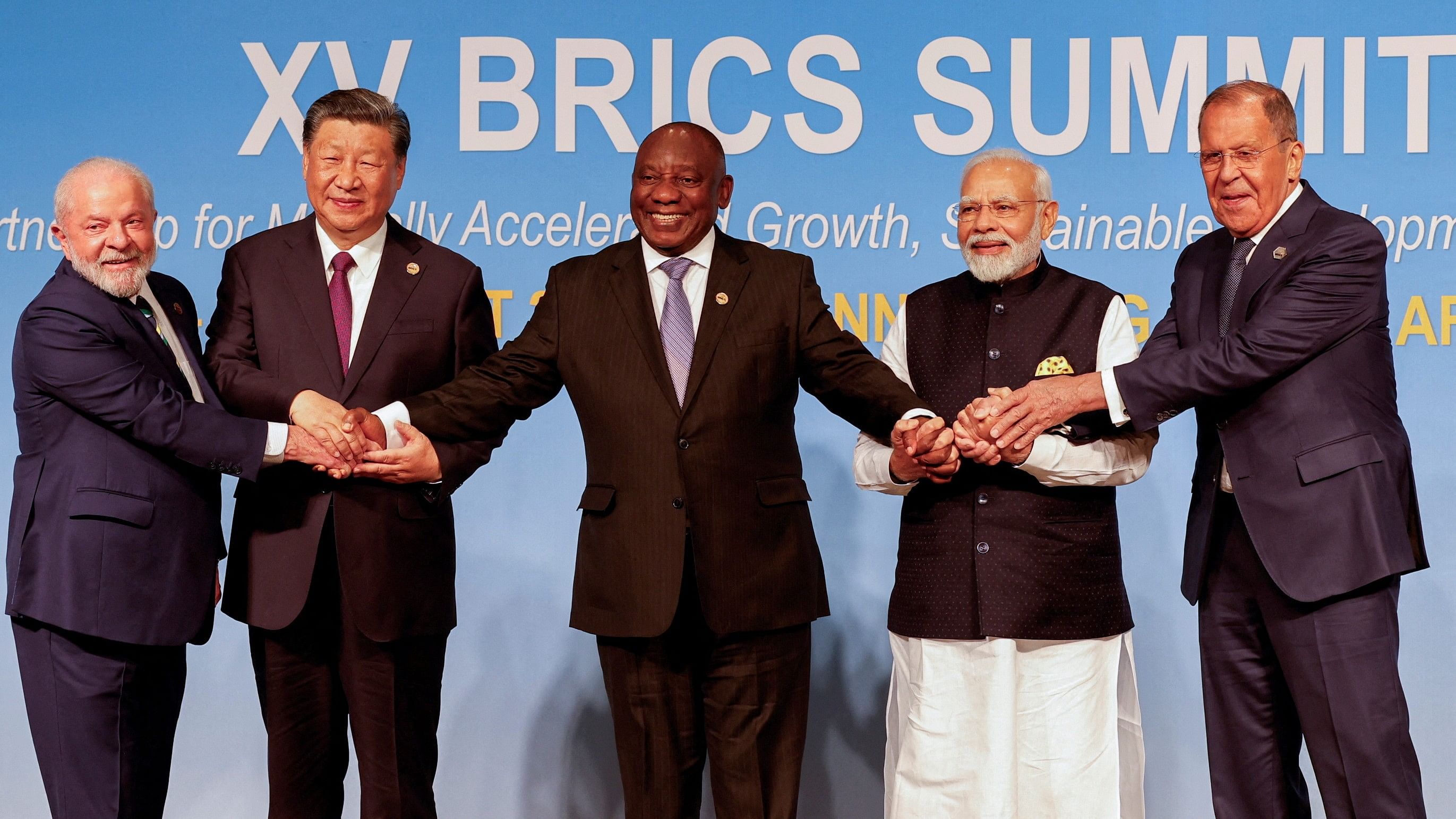
Leaders pose for a BRICS family photo during the 2023 BRICS Summit at the Sandton Convention Centre in Johannesburg, South Africa, on August 23, 2023.
Credit: Reuters Photos
The recently concluded 15th BRICS summit in South Africa has decided to invite six countries viz. Argentina, Egypt, Ethiopia, Iran, Saudi Arabia, and the United Arab Emirates as full members. They will join Brazil, Russia, India, China, and South Africa from January 1, 2024. This is only the first phase of the extension. South African President Cyril Ramaphosa declared that “other phases will follow”.
Although the issue of BRICS expansion has been pending for some time, the quick inclusion of six countries is remarkable. At first glance, expansion may indicate a strong China-Russia imprint. However, five out of six new members have also established strategic partnerships with India; and New Delhi has a strong development partnership with Ethiopia.
As per the summit declaration, a consensus “on the guiding principles, standards, criteria and procedures” for the expansion has been agreed. As this is an internal document, we may have to wait for the details. However, it is likely that a few more countries may join at the Kazan summit in Russia in 2024.
There was always a certain interest in a few countries to join the grouping. The recent weaponisation of the global financial system by the West has alarmed most countries in the South, which are looking for alternatives. With more key non-Western countries joining the grouping, BRICS may slowly emerge as a potential alternative, at least in certain economic matters.
The BRIC started as an economic grouping. Although evolving global geopolitics has clearly influenced BRICS’ functioning, there is still certain geo-economic logic in the latest expansion.
The expansion is energy-centric and West Asian centric. In 2022, six out of 10 top oil producers in the world were from the expanded BRICS. They produced 30 per cent of the total global oil output. This included Saudi Arabia (12 per cent), Russia (11 per cent), China (5 per cent), Brazil, the UAE and Iran (4 per cent each). Similarly, China, India, Russia, Saudi Arabia, and Brazil consumed about 30 per cent of the global oil produced.
Many countries, including India, China, Russia, Iran, and the UAE, are already doing some of their energy transactions in local currencies. Currently, most of these transactions are bilateral. India has also used the UAE dirham and Chinese yuan to pay for Russian oil imports. Since policy makers from these countries will be meeting regularly in different BRICS meetings, they may work out a multilateral mechanism to deal with energy transactions in their own currencies.
With more and more countries joining, BRICS would obviously be no longer a grouping with mainly economic underpinnings. It will become a strong non-Western geopolitical organisation with the aim of strengthening a multipolar world order. With more countries with different foreign policy orientations joining BRICS, the charge of an anti-US grouping may also weaken.
China-Russia-Iran may have a strong anti-US stance. The same cannot be true for India, Egypt, Saudi Arabia, and the UAE. This feeling was clearly expressed by Brazilian President Luiz Inacio Lula da Silva when he asserted that "we do not want to be a counterpoint to the G7, G20 or the United States …we just want to organize ourselves."
Being the largest economy and a major trading partner of all BRICS members, China is likely to have a bigger clout within the grouping. Therefore, many in the West may consider an expanding BRICS as one of the long term Chinese strategies being implemented for a Beijing-centric order.
However, it may not be easy for any one country in the grouping, even for China, to influence so many big and diverse countries easily. So, the effectiveness of the grouping will continue to be a challenge. It was already being mocked by many as merely as a talking shop. However, eagerness of so many diverse countries to join the grouping indicates its relevance.
The world order is changing. The ineffectiveness of existing multilateral organisations including the UNSC and WTO is evident. No one country including the United States or China has the capacity to singlehandedly lead the world. In the current geopolitical setting, the BRICS expansion will provide immediate comfort to China, Russia, and Iran. But in the medium run, the expanded BRICS will help strengthen multipolarity, despite its imperfections. It may also have the potential to provide some of the answers to current global governance flaws.
(Gulshan Sachdeva is Professor, Centre for European Studies, and Co-ordinator, Jean Monnet Centre of Excellence, Jawaharlal Nehru University, New Delhi.)
Disclaimer: The views expressed above are the author's own. They do not necessarily reflect the views of DH.